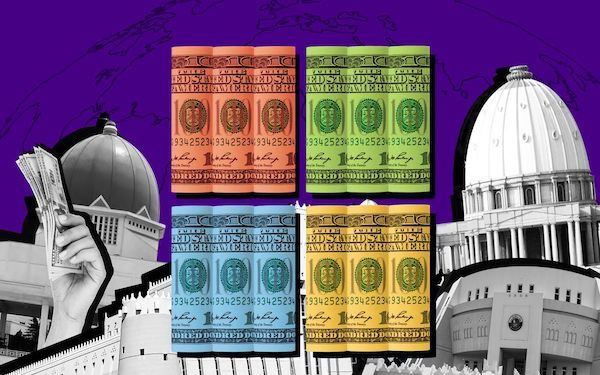The old owner sold the house but still gave the debt, the new owner took the house as a mortgage for a bank loan and defaulted, can the old owner claim the money?
The bank loaned Ms. A 8 billion dong, secured by 02 real estate in the city with a certificate of land use right (LURC) – also known as a red book – in the name of the owner of Mrs. A.
During the loan process, Ms. A did not pay on time, so the bank transferred overdue the entire loan, the total obligation that Ms. A had to pay to the bank was VND 14.78 billion, including principal and interest. within the term, interest is overdue.
Ms. A was unable to pay this amount, so the Bank requested the sale of her property to recover the debt. At this time, things became troublesome when one of the two mortgaged properties by Mrs. A, temporarily called land parcel X, could not be handled due to the appearance of … another owner. And behind that is the story of “losing money” when too trusting people and the consequences from a legal perspective.

Going back more than 2 years ago, Mrs. A bought Mrs. B’s house for 5.5 billion VND, but just paid 3 billion VND, and still owed 2.5 billion VND. This money, Mrs. A beggars and asks Ms. B to sign a notarized purchase and sale contract, then transfer the name of the red book to Ms. A.
The purpose, as explained by Ms. A, is to mortgage the property (the owner) to borrow money from the bank to pay off for Mrs. B.
It may be because the two sides have acquaintances (or even close acquaintances), maybe Mrs. B is too trusting of people to be easy, or because of some other reason, only knowing that Ms. B agrees. After that, the red book was transferred to Mrs. A’s name, and Mrs. B’s family still lived happily on land X, waiting for the payment due date to get enough money to hand over the house.
It is worth mentioning that after borrowing money from the bank, Ms. A did not pay the remaining amount of 2.5 billion dong as promised. Many times to ask for money but failed, nearly 2 years later, Ms. B sued Ms. A in court, asking to take back the house and return to Ms. A the amount of 3 billion dong previously received.
Accordingly, Ms. B proposed to cancel the contract of transferring house ownership and residential land use rights related to land plot X on the reason that Ms. A bought the house but still has not paid in full.
After a few months, the Bank also filed a lawsuit against Ms. A, asking to sell the collateral to recover the debt in case Ms. A could not pay the debt.
After much controversy by the parties from the first instance and appellate courts up to cassation, the Court made a ruling based on the following grounds:
The firstAccording to the documents in the case file, it is determined that property X belongs to Ms. A who received the legal transfer from Ms. B under the notarized transfer of house ownership and residential land use contracts.
Ms. A has been granted a LURC, so she has the right to use this property as collateral for a bank loan. Mrs. B knows this but does not prevent it.
Secondthe mortgage contract has been notarized, the mortgage registration and the security transaction registration are legally valid.
Tuesday, the fact that Ms. B thinks that Ms. A has not fully paid for the house purchase, so she asks to cancel the house purchase and sale contract and return the amount of 3 billion VND (received the first payment) is unfounded. If Ms. A does not pay the outstanding amount, Ms. B has the right to initiate another lawsuit to ask Ms. A to pay this amount.
Resultthe court decided for the bank to have the right to request the sale of assets to recover debts when Ms. A failed to pay or did not pay in full within 6 months from the effective date of the judgment.
This is a rewritten content based on a real case, which is the content of case law number 43/2021/AL on the validity of a mortgage contract in case the mortgaged property is a house and land accepted by the mortgagor. transferred from another person but have not yet paid enough money to the seller.
The term “case precedent” is of Latin origin and is understood as a pre-existing, prior occurrence or way of dealing with a certain situation, which is considered a model for handling similar situations in the future.
Case Case 43/2021/AL is the 43rd published precedent of the Supreme People’s Court in Vietnam, approved by the Council of Judges of the Supreme People’s Court, and Chief Justice Nguyen Hoa Binh issued a public decision. published on March 12 and took effect for courts at all levels across the country to study and apply in trial from April 15, 2021.
Case precedent 43 is based on the cassation decision No. 01 dated January 11, 2019 of the Council of Judges of the Supreme People’s Court on the commercial business case of a credit contract dispute in Ho Chi Minh City. , the content revolves around civil, mainly on mortgage of property, including the transfer contract, the issuance of certificates and the issue of contract cancellation for house ownership and residential land use rights; pay off the house and land purchase; contract and mortgage registration.
This is a case law proposed by the Department of Legal and Scientific Management of the Supreme People’s Court.
Viewed from this case law number 43, perhaps the most profound lesson is for those who intend to sell their houses but have not received all the money but still “facilitate” to the name of the red book. You don’t have to give your best to receive sincerity, what you get, sometimes it’s… a wall.
As the story of Mrs. B, although she has remained and has not yet handed over the house, legally, once the procedure has been completed to transfer the LURC and assets on the land to the buyer, the seller no longer has any legal rights to the property. property, regardless of whether full payment has been made by the buyer.
With the bank, even though in this case, the bank is protected by law with its legitimate rights and interests, it is clear that due to a dispute over property, the process of requesting sale and handling of assets has been dragged down. long, takes a lot of time, effort, cost and money.
You will be “shocked” if you know the process from the start of the lawsuit taking place in 2011, through appeals, hearings from first instance, appellate, cassation and only really ended. in… 2019, that is, it takes up to 8 years for a lawsuit to claim the sale of property, when the property is in dispute.
It is not without reason that in the real estate appraisal process of many banks, or experienced credit officers, when going to appraise real estate, they always have to appraise the people who are actually living on the property. It is to detect things like a house bought but the old owner is still living (debts money, money problems, ..), people with suspicious signs are living (creditors, .. ), avoid mortgage of potentially disputed collateral.
Following the Economic Lifestyle
at Blogtuan.info – Source: cafebiz.vn – Read the original article here



